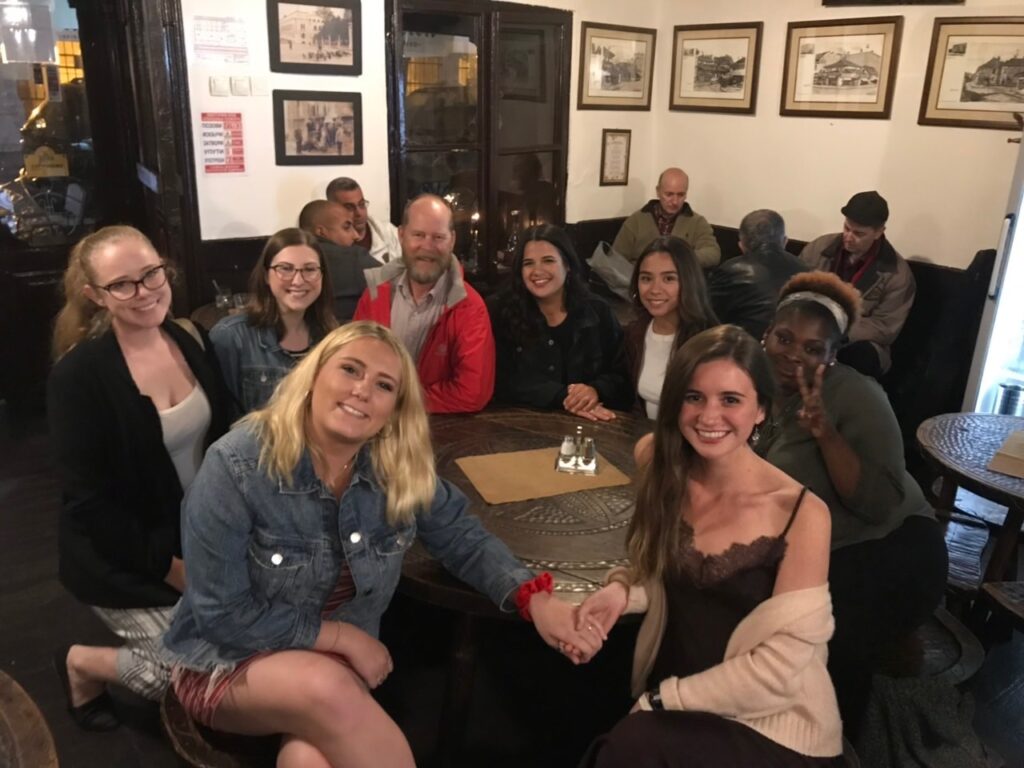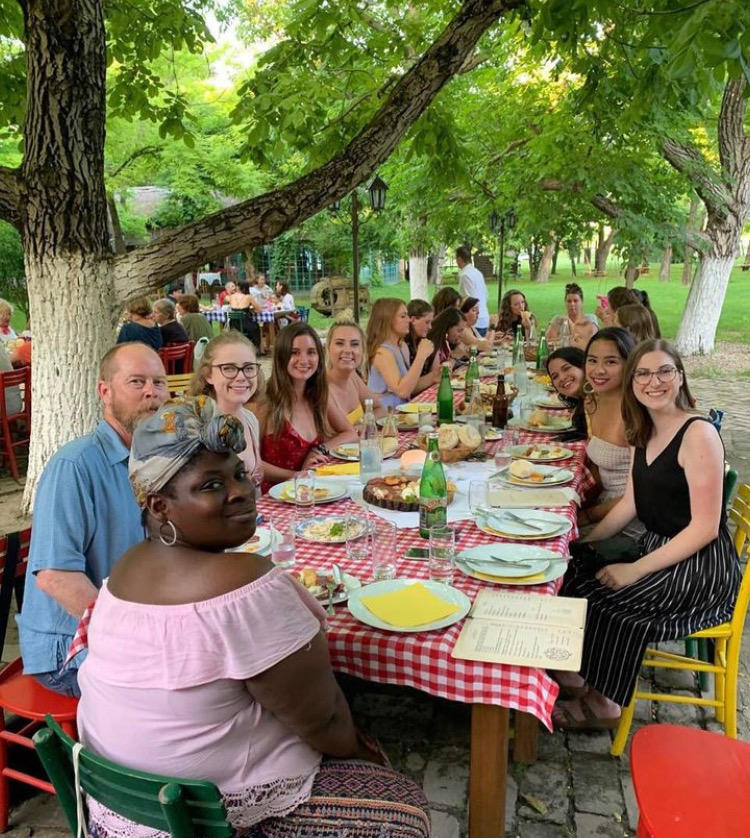Last month, Professor of Health and Rehabilitation Sciences at Temple, Bryan P. McCormick, published, “Disability in Southeast Europe Qualitative Analysis of a Faculty-Led Study Abroad Program,” in the Therapeutic Recreation Journal.
His article featured a summer program he leads in Belgrade, Serbia that enables juniors in Temple’s Recreational and Restorative Therapy Program to gain essential hands-on experience.
Participating students hone their craft while filling their program’s internship requirement by working in social service programs for youth with disabilities. This five-week program was carried out in collaboration with the Special Education and Rehabilitation faculty at the University of Belgrade, to help students reach a diverse understanding of recreational therapy and its applications.
McCormick chose the Serbian region because of his past Fulbright scholarship to Serbia (2010) and Bosnia (2017) and his continued travel there before the pandemic.
His past Serbian connections, former colleagues who are now directors of many of the institutions the group visited, such as Fadilj Eminović, professor of special education and rehabilitation at the University of Belgrade, helped Temple students access schools and facilities that specialize in treating children and youth with disabilities and adults with autism, blindness or hearing-impairment in Serbia, Bosnia, Croatia, and other nearby locations.
While teaching at Indiana University, McCormick co-developed this program together with Professor Shay Dawson. McCormick then brought the program to Temple in 2017. Students studying recreational therapy, psychology, speech and hearing, and other interdisciplinary fields joined the last program in 2019. Now that the pandemic is over, considering the strong takeaways by students, he is seeking funding to repeat this program.
According to McCormick, Serbian culture differs greatly from American culture. Serbians have their own language and alphabet as well as their own community systems and standards, including those for the overall treatment of intellectual disabilities and mental health conditions.
“Understanding these systems is part of the cultural sensitivity these students develop as well as understanding some of the challenges these systems face.”
Bryan McCormick.
Students’ understanding comes from interactions with clients in the various regional facilities through in-depth fieldwork and the experience of full immersion in Serbian culture. Along with their fieldwork, their itinerary consisted of an introduction to the area’s history, learning basic Serbian words, and touring.

Preparing for the Program
Before the program, McCormick asked the participating students to use VoiceThread, to reflect on the following questions (VoiceThread is a collaborative tool to create online presentations.):
- What are your general thoughts on this program to Serbia as we start this process?
- What questions are in your mind at this point, if any?
- What are you excited about if anything?
- What are you anxious about if anything? What are your expectations?
Students’ answers displayed an underlying layer of anxiety and anticipation. Their feelings ranged from excitement about experiencing a different culture to being nervous about the six-hour time difference.
The Middle of the Program
During the middle of the program, McCormick asked the students:
- What are your impressions of the program at this middle phase? What have you learned, if anything?
- What has surprised you if anything?
- What have you liked the most about the experience?
- Any issues that you have had with the program thus far?
- Has it been different than you expected?
He found that students’ learning accelerated through cultural comparison as well as their sense of connection and bonding with others on the program.
During their time there, students focused on direct service by engaging the clients in small crafts, card games, and other activities.
“Despite their lack of resources, in Serbia, they have come up with some ingenious ways to solve problems, and that’s what we encourage students to bring back,” said McCormick.
One of these ingenious ways is “blister paper that students used for clients with visual impairments.” It is a specially treated type of paper that when heated causes anything written or drawn upon it to blister and raise. This turns two-dimensional materials into three-dimensions for improved readability.
To evaluate what systems are succeeding and what can be applied for improvement in the U.S., students then did a comparison with U.S. systems to what they saw applied in Serbia.
For example, McCormick pointed to the Milan Petrovic School in the city of Novi Sad, which supplies services for clients with intellectual and developmental disabilities from pre-school through adulthood. The school works with city officials to obtain public school buildings that are no longer needed. They convert these buildings into locations for day programs for adults with autism and for pre-school programs.
Summing up how her experience in Serbia helped her flex her ingenuity, Temple alumna Mary Keenan ’20 who is now a speech pathologist, said, “With the language barrier I had to really get creative to communicate and find common ground with the people we worked with. It prepared me for working with non-verbal patients as a speech pathologist,” she added.

Program’s End: Conclusions
Through his own cultural comparison, McCormick explained the difference between U.S. and Serbian societies as the difference between individualistic and collective societies.
With a lack of financial resources to support those with various disabilities, Serbia still needs to find a way. This is often done through the community and extended family and leans towards collectivism. As the U.S. is more individualistic, those without the necessary resources often go unaided.
Throughout the program, students observed people with disabilities interacting with their communities in Serbia more publicly. According to McCormick, those with disabilities in the U.S., tend to hide in their homes, which impairs cognitive functions.
As the program concluded, McCormick posed the following requests and questions to the students:
- Talk about your experience with this study abroad program.
- What values, opinions, and beliefs have changed, if any?
- What learning occurred for you in this experience, if any?
- If you did learn something, how do you anticipate applying this learning in the therapeutic recreation field?
- If you could do the experience again, what would you do differently? What improvements could be made to the program, if any?
- Complete this sentence: Because of my experience, I am…
“One student said it was the same apartment but not the same me,” said McCormick
Working to recruit students for a new program, McCormick emphasized the importance of continuing this experience, particularly with few health professions opportunities in other study abroad locations.
Past student, Keenan, affirms the program’s meaning. “This experience really taught us to appreciate the people around us and celebrate every moment,” said Keenan.
She pointed to the word “Живели” (Živeli), which means “Cheers.” This positive Serbian attitude celebrating life has remained with her and the other participants long after the program.
By Jadyn Amelia Howard, communications intern ’22-’23
Header Photo provided by Brian McCormick
Header Photo Caption: Recreational Therapy activities with children who live at Sremčica, a settlement in Belgrade, Serbia.

